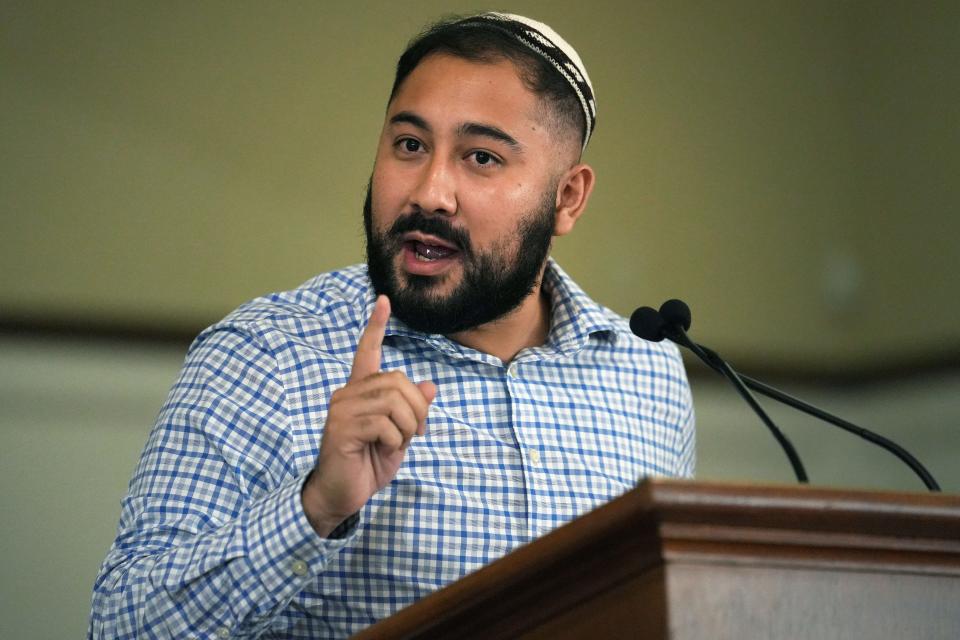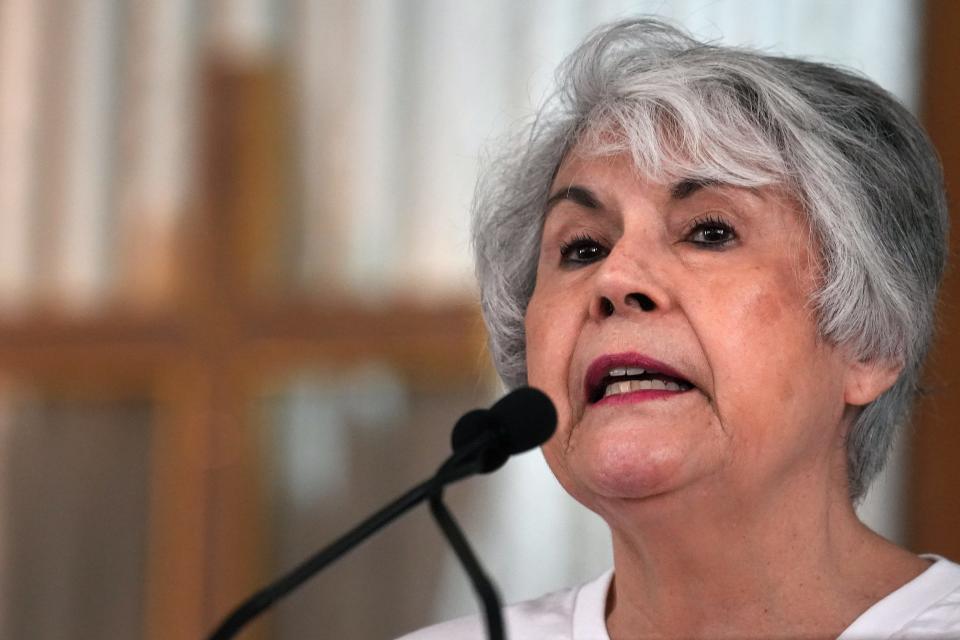'I understood his pain': Advocates denounce confiscating belongings from migrants at border
When migrants arrive at the U.S. border seeking asylum, they carry both the weight of their journey and the weight of their backpacks.
“I want us to close our eyes and think for a second. What would you put in that backpack?" asked Pedro de Velasco, director of education and advocacy at the Kino Border Initiative.
He addressed a crowd of about 50 people gathered on Thursday at the First Church United Church of Christ in Phoenix to call for action to protect migrants' rights.
"What important items would you carry with yourself to this journey to an unknown country, probably never to return?” Velasco said.
"You're probably thinking about pictures of your children, of your loved ones. You’re probably thinking about letters from your family, from your relatives, encouraging words. You’re probably thinking about prayers, the Bible, the crucifix," Velasco continued. “You're also probably thinking about basic needs. You know, your passport, your birth certificate, proof of your case (of asylum).”
Advocacy groups say Border Patrol agents in Yuma are forcing migrants to abandon items like the ones Velasco mentioned.
Nathalie Hernandez Barahona, a first-generation Chicana who works with the AZ-CA Humanitarian Coalition organization, said medications, shoes and clothing were also some of the items migrants were leaving behind after their long journeys to the border.
“I will never forget seeing a wheelchair at the border wondering how that individual continued with their journey,” Hernandez Barahona said.
She recalled how her father told her that when he migrated to the United States, his personal property was confiscated and thrown away. This was in the 1980s, she said.
“These practices cause so much sadness and despair for those seeking a better life …This has been happening for far too long,” Hernandez Barahona said.
The Uncage & Reunite Families Coalition organized the news conference to “expose” this treatment. People held posters with statements such as “Yuma’s border patrol’s trash is immigrants’ treasure,” and signs with phrases like “Stop cruelty” or “Stop bullying” were around the church.
Chelsea Sachau, an attorney with the Florence Immigrant and Refugee Rights Project, said the confiscation of items is “incredibly concerning” since medical records, medications and personal documents can be crucial for migrants in their cases to seek asylum. She said their lives can depend on them.
“One of my first clients that I ever met with carried 500 pages of legal documents from his case in his home country. He wrapped them in plastic, and he left other things at home because he knew how important those papers would be to show why his country's legal systems had failed. And he did win his case. But if he had passed through Yuma today and had his documents confiscated, he might have never won.”
Those who lose their asylum case risk deportation back to their country and to the dangers that made them leave in the first place.
Besides the documents, Sachau said she has heard that some people are forced to leave their religious items behind. For instance, Sikh people have been asked to remove their turbans in the Yuma sector, she said.
“All of these combined are actions that violate the rights and freedoms of asylum seekers,” Sachau said.

These actions can also be deadly, according to Eddie Chavez Calderon, a campaign organizer for Arizona Jews for Justice. At the news conference, he said he once helped a girl whose kidney medication had been thrown away and who had gotten a urinary infection.
He recalled the father of the girl asking for help.
“I could see the pain in his face, the pain in his body. I may not have understood him, but I understood his pain,” Chavez Calderon said.
What happens with the property that is left behind?
The U.S. Customs and Border Protection National Standards on Transport, Escort, Detention and Search states that the personal property of people who are detained that is not deemed to be contraband will be safeguarded, itemized and documented. The property will be stored in a secure storage room or area and will be transferred with the migrant if possible, according to the standards.
“If personal property cannot be transferred with the detainee, CBP will generally hold personal property for a minimum of 30 days from the processing of a detainee. After 30 days personal property will be considered abandoned and may be destroyed,” the document states.
Special attention will be given to the security and return of monetary personal property and legal papers signed by the migrant will be provided to them per the operational office’s policies and procedures, the document states.
According to the document, medications will be maintained with the personal property unless the medication needs to be regularly administered or needs to be properly stored per the prescriptions.
Sometimes when items are confiscated, the Border Patrol retains them for 30 to 60 days, according to Sachau.
Some migrants are given tickets to claim their belongings later; however, she said in her experience she hasn’t seen or heard of a case where people were able to pick up their items because they are already across the country or some are deported.
“It's not that Border Patrol sends it to you. You have to come back and reclaim it. And that's not really possible and feasible for certain people, especially if they don't have the proper documents to, say, get on an airplane, or something like that,” Sachau said.
Sachau said safety and logistical issues for transportation have been some of the reasons that agents give to explain why they confiscate the items.
Advocates say in other cases, the belongings are thrown away. A video shown during the news conference showed pictures of piles of backpacks and clothes left at the border. Pictures of passports, crucifixes and medications on the ground were also shown.
Velasco said last weekend he supported a group of 12 migrants who said patrol agents took away their belongings and told them they would return them after arriving to Tucson, “which never happened.”
“One individual lost $200, wallets, phones and jewelry with sentimental value,” Velasco said. “One person from the group shared that they witnessed a Border Patrol agent take $3,000 pesos from another migrant and rip it off in his face, saying, ‘This is trash, this is of no value to you here,’ before throwing the ripped bills in the trash.”
CBP: Internal investigation opened
Customs and Border Protection Commissioner Chris Magnus responded to the concerns about personal property, including turbans, being removed and discarded while migrants were in CBP custody.
“We take allegations of this nature very seriously,” said Magnus in an emailed statement. “This issue was raised in June and steps were immediately taken to address the situation. Our expectation is that CBP employees treat all migrants we encounter with respect.”
The statement said an internal investigation was opened to address the situation.
'It has not stopped and it's not likely to stop'

Esther Duran Lumm, co-chair of the Uncage & Reunite Families Coalition, said they have raised the issues at the border to officials, including congressional members and leadership with the Department of Homeland Security.
A statement issued on Wednesday from the office of U.S. Rep. Raúl M. Grijalva said he led 22 members of Congress in sending a letter to Magnus and Tae D. Johnson, acting director of Immigration and Customs Enforcement, about CBP agents confiscating and discarding migrants’ personal documents and religious property.
In the letter, they ask the agencies to answer questions about their standards, policies and procedures, and how they are overseeing these.
This is the type of action that Duran Lumm said she and other advocates are seeking. By the end of the event, she asked the public to contact elected officials and ask them to do something about it.
“We felt that we had to hold this press conference in order to make the public aware of what has been occurring for a very long time. … We know for a fact that it has not stopped and it's not likely to stop because so many of those agencies believe that they are above the law,” Duran Lumm said.
Reach breaking news reporter Angela Cordoba Perez at Angela.CordobaPerez@Gannett.com or on Twitter @AngelaCordobaP.
Support local journalism. Subscribe to azcentral.com today.
This article originally appeared on Arizona Republic: Advocates denounce confiscating belongings from migrants at border

